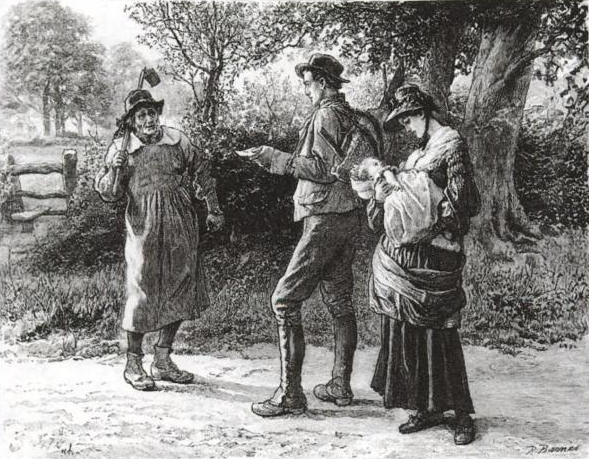More Thomas Hardy - it's an enormous bedtime treat to hear such a distinctive voice creating landscapes of intense power and melancholy.
Woodcut for The Mayor of Casterbridge, source wikipedia
I began with Under the Greenwood Tree, because of my interest in harmoniums - on which more shortly. Next The Mayor of Casterbridge. I don't intend to give away the plot, but what struck me most forcefully here was the amount of social mobility. Michael Henchard, the eponymous hero, or anti-hero, begins the story as a lowly journeyman hay-trusser. He rises to become a wealthy corn-merchant and the mayor of Casterbridge - he is at the top of the social tree in his community. Of course, as so often with Hardy, decline and melancholy follow.
Based only on my stereotypes of rural nineteenth-century society, I was surprised to find that such social mobility could form a credible plot. And this helps me looking back to the fourteenth century also. It is so easy to assume that past societies were immobile, that hierarchies were fixed, and that social position was immutable. I've certainly assumed this very often of the Middle Ages, and the 'true' stories of dramatic social rises are few and far between. But by the fourteenth century, the wheel of fortune was an immensely popular literary and iconographical motif: the idea of a great rise in fortunes, and the precariousness of any social standing, was something which resonated with people who felt both empowered and vulnerable. If many were trapped in their positions, others had, dangled before them, the possibility of economic and social climbing - opportunities which worked both ways, as the commercially successful could also fall catastrophically.
From an edition of Boccaccio's De Casibus Virorum Illustrium showing Lady Fortune spinning her wheel (wikipedia)
It's useful to remember that few societies are as immutable as they appear - but that, much as politicians might like to focus on the upward trajectories, their very existence makes success all the more fragile: each success story so often masks a fall.



No comments:
Post a Comment